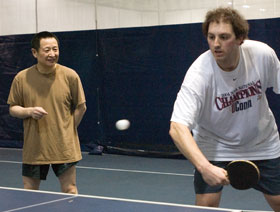  |
| HOME | THIS ISSUE | CALENDAR | GRANTS | BACK ISSUES | < BACK | NEXT > |
History professor studies how sports and government mix in Chinaby Scott Brinckerhoff - April 23, 2007 | ||||
| Imagine the scandal that would ensue if the White House pressured a U.S. athlete in an international sporting event to lose to a competitor from a country the Administration was courting. Talk about bad press. Decades ago in China, this sort of activity was common, according to history professor Guanhua Wang, who is working on a book about the history of organized sports in China. The book will look in particular at the 1960’s to the 1990’s. Wang says it will document how a centralized government micromanaged athletics and tried to advance social and political goals by promoting and glorifying sport. Sports, says Wang, was one way for China to unite its people as they followed a new government down the road to modernization. He’s not critical of the government for its manipulation of sports, because he believes its motives were “genuine, arduous, and even heroic.” But, he adds, its activities constitute “a mixed legacy. “The state has been successful at using sports for political purposes, enhancing the nation’s identity,” Wang says, “but the government’s tendency to micromanage sports has also caused problems.” An example is the fiasco of occasionally trying to dictate the outcome of a match. Wang cites several cases, including one in 1971 when a Chinese ping pong player was instructed to lose to a North Korean player, but didn’t. Ironically, the Chinese player balked because teammates did not win their matches, as they had been choreographed to do. He figured there was no longer any reason for him to lose, but Wang says the leaders in Beijing were piqued by his insolence. Wang believes the state’s manipulation of sports contributed to a gradual shift in the attitudes of ordinary citizens. For example, he believes people became cynical and prone to dishonesty in their daily lives in part because of the example set by the government in sports. Wang says, “In sports, everyone understands the rules of the game and accepts them, but to the Chinese sports bureaucracy, rules are arbitrary, and sometimes old rules are never officially abandoned, so people in power can pick and choose which ones to apply. “For example, the rule used to be that retired athletes would have jobs waiting for them, commensurate with their standing in society. But in practice, the state was unable to provide good jobs, and in any case the athletes were usually ill-prepared for anything but athletics.” To research his book, Wang has been poring through documents in Chinese archives, including those of the National Sports Committee. He has also interviewed hundreds of athletes, sports journalists, coaches, and officials in China, Japan, Canada, and the U.S. Sometimes it is hard to get answers, because Chinese sports sources treat their information as “state secrets.” Decades ago, team members were all paid the same, and the occasional sponsorships tended to go only to individual players.
Today, salaries vary and sponsorships are more likely to go to an entire team, as they do in the U.S. And, in contrast to when sporting events were free or cost fans only a nominal fee, Chinese fans now pay much higher prices for an afternoon at the soccer stadium. Wang, who grew up in Beijing in the 1960’s, recalls that physical exercise was always very popular in China. “The government encouraged it,” he says. “We played soccer and team games, and the boys compared muscles. There were documentary films about sports and, during the Cultural Revolution, sports were promoted as a way for China to advance socially and politically.” Wang’s book covers both “expert” and mass sports. Expert athletes, employed by the state, are the rough equivalent of U.S. professionals; while mass sports cover everything else that people do for exercise or friendly competition. Wang, a fellow of the Humanities Institute, also teaches a class on modern China. Much has changed in Chinese sports today, Wang says. Now, “expert” athletes are often goodwill ambassadors for China; they travel internationally, and frequently become wealthy, though not by the standards of the West’s best-paid athletes. In many ways, Wang says, the changes that have occurred in the Chinese sports world parallel those that have occurred in Chinese government and society, where Western capitalist thinking and values have penetrated to some extent. “Sports in China have become much more commercialized than they were in the 1970’s and 1980’s,” he says. “Sponsorships by big sporting goods or bottled water companies are common, and different athletes on the same team are paid differently.” Wang’s book will give readers a historical perspective on sports in China, but the 21st-century story will be told at the Beijing Olympics. It’s an event that brings out ambivalent feelings in Wang. “The Olympics represent the ultimate commercialization of sport,” he says. “China faces urgent social and political problems, and the Olympics are an elite event that I believe ultimately won’t bring much benefit to the overall population.” |
| ADVANCE HOME UCONN HOME |

